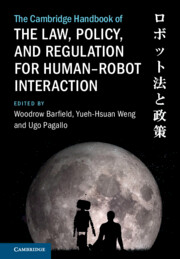Book contents
- The Cambridge Handbook of the Law, Policy, and Regulation for Human–Robot Interaction
- The Cambridge Handbook of the Law, Policy, and Regulation for Human–Robot Interaction
- Copyright page
- Dedication
- Contents
- Figures
- Tables
- Contributors
- Foreword
- Preface
- Part I An Introduction to the Law, Policy, and Regulation for Human–Robot Interaction
- Part II Issues and Concerns for Human–Robot Interaction
- 10 I, Robot? Legal Personality for Robots and the Android Fallacy
- 11 “Legal Being”
- 12 Robot Romance
- 13 Robot Natives
- 14 Should Social and Assistive Robots Integrated within Home- and Healthcare Services Be Universally Designed?
- 15 Regulating Emotional Artificial Intelligence in Cars
- 16 Some Critical Thoughts on Anthropomorphic Social Robot Design
- 17 A Critical Analysis of Consent in Human–Robot Interaction
- 18 Rosie Is a Rental
- 19 Bots against Bias
- Part III Ethics, Culture, and Values Impacted by Human–Robot Interactions
- Part IV Legal Challenges for Human–Robot Interaction
10 - I, Robot? Legal Personality for Robots and the Android Fallacy
from Part II - Issues and Concerns for Human–Robot Interaction
Published online by Cambridge University Press: 07 December 2024
- The Cambridge Handbook of the Law, Policy, and Regulation for Human–Robot Interaction
- The Cambridge Handbook of the Law, Policy, and Regulation for Human–Robot Interaction
- Copyright page
- Dedication
- Contents
- Figures
- Tables
- Contributors
- Foreword
- Preface
- Part I An Introduction to the Law, Policy, and Regulation for Human–Robot Interaction
- Part II Issues and Concerns for Human–Robot Interaction
- 10 I, Robot? Legal Personality for Robots and the Android Fallacy
- 11 “Legal Being”
- 12 Robot Romance
- 13 Robot Natives
- 14 Should Social and Assistive Robots Integrated within Home- and Healthcare Services Be Universally Designed?
- 15 Regulating Emotional Artificial Intelligence in Cars
- 16 Some Critical Thoughts on Anthropomorphic Social Robot Design
- 17 A Critical Analysis of Consent in Human–Robot Interaction
- 18 Rosie Is a Rental
- 19 Bots against Bias
- Part III Ethics, Culture, and Values Impacted by Human–Robot Interactions
- Part IV Legal Challenges for Human–Robot Interaction
Summary
Could robots be recognized as legal persons? Should they? Much of the discussion of these topics is distorted by fictional representations of what form true artificial intelligence (AI) might take – in particular that it would be of human-level intellect and be embodied in humanoid form. Such robots are the focus of this volume, with the possibility that external appearance and its echoes in science fiction may shape debate over their “rights.” Most legal systems would be able to grant some form of personality, yet early considerations of whether they should conflate two discrete rationales. The first is instrumental, analogous to the economic reasons why corporations are granted personality. The second is inherent, linked to the manner in which human personality is recognized. Neither is sufficient to justify legal personality for robots today. A third reason, which may become more pressing in the medium term, is tied to the possibility of AI systems that far surpass humans in terms of ability. In the event that such entities are created, the question may shift from whether we recognize them under the law, to whether they recognize us.
- Type
- Chapter
- Information
- The Cambridge Handbook of the Law, Policy, and Regulation for Human–Robot Interaction , pp. 173 - 192Publisher: Cambridge University PressPrint publication year: 2024

